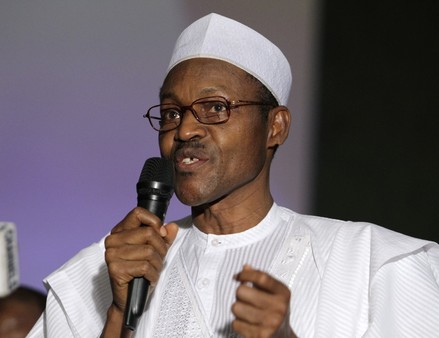By ANIEBO NWAMU —
My hope is that President Muhammadu Buhari’s reign won’t be defined by what he said or left unsaid in his very first speech as civilian president. Words are less important than actions, however. After all, we have listened to several presidential addresses that magnified hopes but led nowhere.
I expected the man I had admired 31 years ago for his war on indiscipline and corruption to send a clear message to looters of our common wealth. By spending valuable time to salute, thank and even reassure some of the very scoundrels he had sent to jail in 1984 (and others that should have since joined them in jail), the new president mocked the alternate speech published in this space last week. Are all the people that looted public funds or wrecked banks and fled with our deposits to now go and enjoy their loot because “I belong to everybody and I belong to nobody”?
The inaugural speech left other questions unanswered: How will the president tackle the energy crisis? Is there still a subsidy on fuel? What will he do with the gang called marketers? The dollar that was exchanging for 75 kobo when he left power in 1985 is now 23,000 kobo; what will he do? What will happen to recurrent expenditures that consume 80 per cent of government’s resources? He promised to create jobs for the youth. How will he do it without regular power and less imports?
President Buhari (PMB) rightly stated: “Continuous tinkering with the structures of power supply and distribution and close to $20billion expended since 1999 have only brought darkness, frustration, misery, and resignation among Nigerians.” Then it’s strange to hear, “The past is prologue.” He must probe into the past in order to find the future’s remedy. In the face of dwindling oil incomes, “insecurity, pervasive corruption”, “fuel and power shortages”, and other 21st century challenges, where will his government source money? Projects, including to “revive major industries and accelerate the revival and development of our railways, roads and general infrastructure”, will require enormous funds.
Will military might alone consume Boko Haram and other criminals that have over the years been fortified by lawlessness and impunity? What if the evil people changed tactics?
I have yet to understand why our new president quoted Shakespeare in Julius Caesar: “There is a tide in the affairs of men which, taken at the flood, leads on to fortune /Omitted, all the voyage of their life/ Is bound in shallows and miseries”. The new regime is perhaps the least of the several tides in the nation’s affairs. The omission of the tides has already landed us as a nation “in shallows and miseries”.
The first of these tides, in my view, occurred in 1953 when our fathers demanded self-government before they became more civilised. We should have allowed the colonialists to remain in power at the centre until about 1980. The second tide was in 1973/74 when new-found oil wealth was not utilised to put this country on the path of industrial, scientific and technological development. [Gowon then said our problem was not money but what to do with money.] The third tide happened in 1985 when the Buhari-Idiagbon military regime was replaced by Babangida’s: it was IBB’s regime that freed treasury looters (and even compensated them later), annulled Abiola’s election, weakened all institutions, encouraged economic saboteurs and eventually set this nation’s economy on irreversible decline. The fourth tide took place in 1998: the Abdulsalami government imposed on the nation a defective constitution tainted with an unsustainable presidential system, “joint accounts”, fulltime legislating and a rigged income policy. Changing that constitution has become impossible, even as feeble attempts to do so have come at much cost to the nation.
Since then, it’s been “the harder you work, the poorer you become” in Nigeria; the richest have been smart “politicians” and their collaborators who destroy rather than build. The average Nigerian doesn’t believe in hard work anymore because criminal elements “succeed” faster.
Our new president’s quest for peace, for jobs and for honesty will come to naught unless the issue of such injustice is redressed. Yes, he may not pay a score, but he should let the law go after all enemies of the state. If the new government failed to confront the evils that have stultified our progress with radical reforms, it would omit the fifth tide in the affairs of our nation.
PMB has asked the media “to exercise its considerable powers with responsibility and patriotism”. I concur – it’s a lesson I received 29 years ago as an undergraduate. But a reporter from PUNCH was reportedly arrested and detained on Thursday because he was taking photos of a new palatial home built in Otuoke. I have seen the photos eventually published. And I can state that the new houses meant for one family are worth at least N1billion. Won’t PMB allow us to question the source of such money?
A Nigerian president’s legitimate income in four years is less than N20million. If a politician could have N1billion property in his home village, his assets in cities around the world can only be imagined. Who would listen to PMB’s anti-corruption message without understanding the genuine sources of funds used to build billion-naira mansions in Minna, Ota, Abuja, Lagos, Port Harcourt, Enugu, Dubai, Europe and America? Or the funds used to purchase blind and one-eyed shares in blue-chip companies, yachts in Italy, and private jets?
Who would embrace farming, mining or teaching by choice when his mates enjoy endless holidays in the Bahamas and “medical tourism” in America owing to armed robbery, fuel “subsidy”, kidnapping white or rich people for ransom, breaking pipelines to steal fuel, and working as thugs for politicians (and later becoming politicians themselves)?
It’s not only the judicial system that “needs reform to cleanse itself from its immediate past”. We must also reform our politics and our polity. It’s a pity PMB said nothing about the 2014 National Conference report. Imperfect as the document may be, it should be the springboard for more structural reform, including regional and LG autonomy. Nigeria’s federalism is unjust and unfair. An accurate headcount will be necessary for redressing the injustice of state and LG creations by military regimes. Lawmaking should be a part-time job; lawmakers should be paid honorariums only. The income policy adopted for civil servants should also apply to politicians. Otherwise, when we allow aspirants to spend billions before they can become governor or president, we must allow them to also recoup their “investments” on getting to office.
Condemnations and praises for the inaugural speech are already trending in the social media. However, as I stated at the beginning, the speech is less important than the actions the new government will take. Let’s give it the benefit of the doubt. The new president should now be more careful in selecting his cabinet members and other foot soldiers. He should look for good people, not “technocrats” some of whom are clever crooks, textbook economists and “experienced” looters. And he should take an interest in the leaderships of the National Assembly. They will ruin or drive his reform programmes.
#














